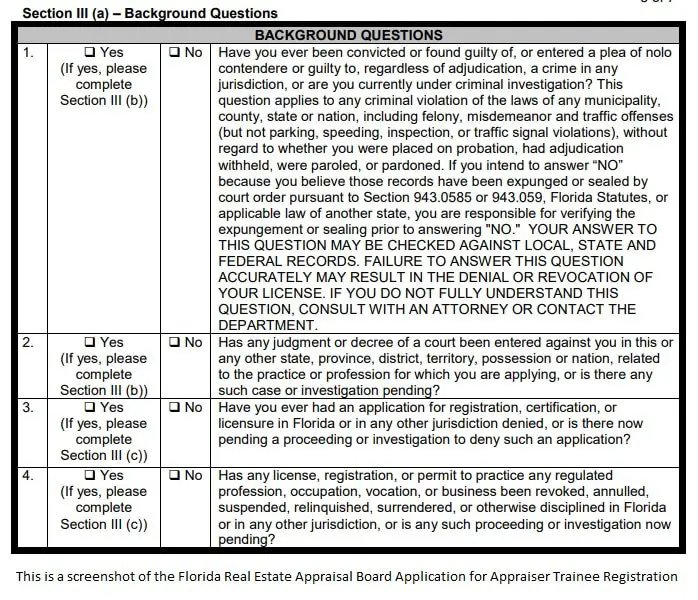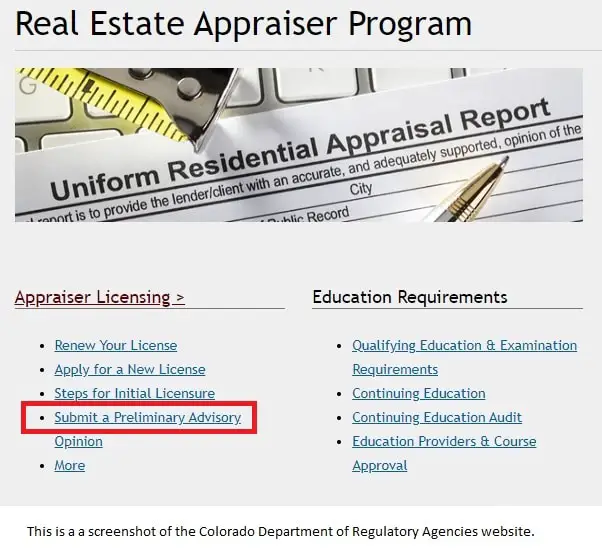(**) Disclosure: This post may contain affiliate links, meaning RealEstateCareerHQ.com will get a commission if you decide to make a purchase through the links, but at no additional cost to you.
To become a real estate appraiser, not only that, you need to complete the pre-licensing education, pass the exam and obtain the required hours of work experience, but the Licensing Board will also conduct a criminal check on you.
After all, your appraisal report is a crucial document for many people. Lenders depend on it to determine the mortgage amount. Investors would review it in making their decision. In many instances, an appraisal is used during a divorce or estate settlement.
Since the appraisal is such a money-sensitive document, the Regulatory Board needs to ensure that you can be a trustworthy professional to the public. The outcome of your report is independent, comply with the industry standard, and that not influenced by other parties.
Furthermore, there are many instances that you would stay alone with clients in the subjected property or enter their premises without accompanied. The Regulatory Board also needs to make sure you are not a dangerous person to deal with.
Can you be a real estate appraiser with a felony? Yes, it is possible for a felon to become a real estate appraiser. The Licensing Board will review the license application on a case-by-case basis. But the decision is subjected to their discretion.
In this post, you will find the common procedures needed when applying for an appraisal license with a felony record. What type of questions will be asked? What kind of documents do you need to provide? Which states have a more lenient or stringent rule? I will also go over other important considerations and helpful ideas when applying for your license.
Which States Can You Become a Real Estate Appraiser with a Felony Record?

Some people said that Georgia is one of the most challenging states to get a real estate appraisal license with a felony record. They said that Georgia has an extremely high rejection rate of 95% for felony applicants.
So I dug further to see if that is true. On the Georgia Real Estate Board website, I found the following:
Applicants should note that the law permits denial of a license based solely on the basis of certain convictions (felonies and crimes of moral turpitude). Over 95% of the time the ALJ has affirmed the initial denial.
Quote from the Georgia Real Estate Board website
You might think this is such a harsh statistics. But don’t get discouraged yet. Let’s read on the following:
“Applicants with prior convictions begin that proof process by submitting a variety of additional documents with their applications. Each year from 450 to 650 applicants (10-15% of all applicants) report (or the Commission discovers) a criminal conviction or a licensing disciplinary action.
For about 85% of such applicants the documentation that they provide and the Commission’s background investigation generally produce sufficient evidence to satisfy the Commission that despite the prior record, the applicant possesses the requisite good reputation. In those cases, it issues a license.”
Quote from the Georgia Real Estate Board website
The way I interpret is that 85% of the applicants with felony records got approval. For those that did not, they appeal the rejection decision at the panel hearing. But most of them did not successfully convince the Licensing Board.
However, each state may hold a different perspective on the severity of the conviction. So it is difficult to make an apple-to-apple comparison as to which states are easy to apply. Keep in mind that all Licensing Boards have a common goal to ensure that licensure has learned from their mistake and can demonstrate professionalism as a real estate appraiser.
The Regulatory Board could be more lenient when the conviction is a misdemeanor, a minor disciplinary action or a violation that posed little harm to the public. The same also holds when it is a youthful indiscretion or an offense that happened a long time ago that a recurrence is unlikely.
On the other hand, the approval could be more challenging if the felon is related to a money issue — for example, a person involved in bribery, or committed fraud to clients.
What Would Be Asked about the Conviction?

I went through several appraiser license applications of different states. They typically would require you to disclose the following:
- What is the nature of the felony?
- When did it happen?
- Is this a one-time conviction or recurring offenses?
- Does it have anything to do with a real estate practice?
- What was the penalty or sentence involved?
- Have all sanctions been satisfied?
- Since you complete the sentence, what steps did you take to reenter society? (i.e., rehabilitation, treatment, employment, education, volunteer)
- Are there any pending charges?

What Documents do You Need to Provide?
If you answer “yes” to any of the felony questions, the Licensing Board would want to know more about the incident. Therefore, they typically would require further documentation about the conviction.
- A written statement explaining the circumstances of each incident;
- A copy of the charging document;
- A copy of the Sentencing Order. (It is an official document that shows the resolution of the charges or any final judgment)
In Florida, the Department of Business and Professional Regulation would need you to fill out a Criminal Self-Reporting Document. In this report, you will provide the name & address of the court, the case number, date of plea, or conviction.
Do Real Estate Appraisers need to go through a Background Check?

According to the new rule (Jan 1st, 2017) from the Appraiser Qualifications Board (AQB), it is not mandatory to go through a formal background check to meet their minimum requirement. Before, they would require you to provide fingerprints as a submission to the Federal Bureau of Investigation.
However, this is just the AQB minimum standard. Each Licensing Commission could impose extra requirements. In fact, I do see that most of the states still require a formal background check.
You would need to go through this process with a vendor that is approved by the Board. For instance, you would go to a LiveScan Service Provider when getting an appraiser license in Florida and use Morpho Trust in Texas. The background check fee is usually around $50 to $100.
To obtain your fingerprints, you need to visit their office location in person. You must bring along a valid government-issued photo ID. Make sure it is not expired.
5 Practical Tips for Appraiser License Applicants with a Felony Record

1) Be honest, be honest, be honest
According to the Appraisal Insitute, the Licensing Boards in 42 states will conduct a background check on criminal records. They will compare your responses with their investigations. If they find any mismatch which you cannot reasonably explain, they could revoke your license application.
Besides, even if you obtain the real estate appraiser license, there could be other temptations working in this profession. You need to commit to honesty in every single decision. I’m sure this principle will reward you in the long run.
2) Get reference letters
Everyone could say brag about how trustworthy, but the comment is not as nearly reliable if it comes from a third-party person. If you are currently working, it is a good idea to ask your employer or supervisor for a reference letter.
In the letter, it should clearly describe your work ethic and your contribution to the company. If you have done any volunteer works, you may request the coordinator for a reference letter too.
But keep in mind, if you ever write down someone as a reference, you must get their consent first. You do not want when the Licensing Board call them to confirm, and they sound unprepared or offended.
Some people find it challenging because they were unable to get hired even after their sanction is satisfied. In that case, you should review re-entry programs in your state. They assist people with felony records to transition back into the community. JobsForFelonsHub.com has lists of re-entry programs in different regions, and you could find their link in the reference section below.
3) Expungement or sealing
These are legal procedures that might be useful for applicants with a felony record. I did some research and below are what I found:
Expungement (also called “expunction”) is a court-ordered process in which the legal record of an arrest or a criminal conviction is “sealed,” or erased in the eyes of the law. When a conviction is expunged, the process may also be referred to as “setting aside a criminal conviction…
An expungement ordinarily means that an arrest or convictions “sealed,” or erased from a person’s criminal record for most purposes. After the expungement process is complete, an arrest or a criminal conviction ordinarily does not need to be disclosed by the person who was arrested or convicted. For example, when filling out an application for a job or apartment, an applicant whose arrest or conviction has been expunged doesn’t need to disclose that arrest or conviction.
In most cases, no record of an expunged arrest or conviction will appear if a potential employer, educational institution, or other company conducts a public records inspection or background search of an individual’s criminal record.
Quote from FindLaw.com -Expungement Basics
So does it apply to the real estate appraiser license? Once again, I reviewed the Florida Trainee Appraiser Application. Below are their wordings:
If you intend to answer “NO” because you believe those records have been expunged or sealed by court order pursuant to Section 943.0585 or 943.059, Florida Statutes, or applicable law of another state, you are responsible for verifying the expungement or sealing prior to answering “NO.”
Quote from Florida Real Estate Appraisal Board Application for Appraiser Trainee Registration
It seems that they recognized expunged or sealed cases if it falls under Section 943.0585 or 943.059. However, I’m not a lawyer and not trying to give any legal advice. So you should consult your situation with a licensed attorney and the Licensing Board in your state.
4) Consult the Licensing Board
Getting a real estate appraiser license does require your time and investment. It could take months for you to complete the pre-licensing education and pass the exam. Then you would need to find a supervisor and obtain the required hours of work experience.
Before you start taking all these massive actions, you should get an opinion from the Licensing Board in your state. But don’t just talk to any random reps through the call center. If they have any official way for you to obtain a formal opinion, I would suggest using it.
For instance, in Colorado, you could submit a preliminary advisory opinion (PAO) to the Divison of Real Estate. They will be able to determine the effect of the offense on licensure.

Even though, the preliminary opinion does not bind their approval decision, you will at least have something in black and white. It could become useful if you ever needed to appeal the rejection.
Unfortunately, not every Licensing Board would provide this preliminary service to the applicant. So be sure to use it if that is available in your state.
Can I submit my real estate appraiser application before taking the course to make sure the Board will approve my background?
No. Proof of education must be submitted with the application. No action will be taken on an application until it is complete and the appropriate fee is paid.
Florida Department of Business and Professional Regulation website
5) Have a well-written resume and cover letter
A well-formatted resume is the first step to demonstrate your willingness to comply with the rules and laws of society. If that is a requirement from the Licensing Commission, then you should put some effort into refining it.
Whereas in the cover letter, don’t merely focus on why you need the appraiser license. You need to think from the regulator’s perspective. If they approve an application, and the licensee causes trouble down the road, then they could be held accountable.
You must re-assure the Licensing Board that you understand what you did wrong, and the same mistake will never recur. Also, you will respect the laws and comply with the regulatory standard.
You should ask someone with excellent writing skills to proofread the cover letter. But make sure that is is a trustworthy person because what you wrote could be confidential. Alternatively, you may use the online proofreading tool, “Grammarly.” This is actually the tool I’m using in writing this post.
Final Thoughts
The Real Estate Appraiser Commission would put into consideration the honesty, trustworthiness, character of the applicant. Whether a felon can be a real estate appraiser is subjected to how the licensing commission evaluates the case.
But no need to get discouraged as everyone has a past. The most important is that you can demonstrate that you will serve the public in a fair, honest, and open manner from now on. Keep in mind that many people depend on your appraisal in making their decision. So your work must be unbiased and independent.
I know I’ve said this many times in this article. But I want to re-emphasize one more time that you should never lie to the Licensing Board. If they ask you questions, then you should answer them as accurate as to the best of your knowledge. You don’t want to end up constantly worrying when the truth will reveal. Build your career on a solid foundation and not on sand.
Furthermore, I’m not saying you need to tell everyone about the felony you have committed. But you should prepare an appropriate response if any clients, AMC or your employer, ask you about it. Don’t immediately feel offended because everyone needs reassurance that they are dealing with a trustworthy professional.
I hope you’ll find this article helpful. If so, please share it and leave me a comment below.
Disclaimer: The information in this post is for general information only, and not intend to provide any advice. They are subjected to change anytime without notice, and not guaranteed to be error-free. For full and exact details, please contact the Appraisal Board in your state, the education or service provider.
Reference:
- Florida Real Estate Appraisal Board Application for Appraiser Trainee Registration (Source)
- Florida Department of Business and Professional Regulation (Source)
- AQB Adopts New State Background Check Requirements (Source)
- JobsForFelonsHub.com – ReEntry Programs (Source)
- FindLaw – Expungement Basics (Source)

